#aslan makes narnia narnia
Text
Something that got me thinking:
I'm in a Narnia fans Facebook group and recently someone posted about how the one thing that bothered him the most about VDT the 2010 movie was how of all the things they've changed, they kept the albatross at the Dark Island, because it makes no sense in the context of the movie.
I commented on maybe because they put it in, because of how iconic the whole scene was and of course here's the line, "Courage, dear heart". But the more I thought, the more I wasn't sure if I remember the albatross saying the line. I spent some time browsing for a clip of the scene untill a fellow member commented that the albatross has indeed not said the line to Lucy. I thanked that member and made a notion how VDT feels off because Aslan isn't a tangible presence in the story and found myself agreeing, that in the context of the movie, the albatross makes zero sense. I'll elaborate here:
Sure, there were changes, even major ones in both LWW and PC. But in both, Aslan was a presence to be reckoned with. Without him, efforts felt shortfallen and misguided. In LWW the children would not win against the witch. Say what you want about that river god and walking trees, the old Narnians were fighting a losing battle without Aslan. But not VDT. Just think about it: Untill the Pevensies get into Narnia, it's fine, but then it's like, they sail to the Lone Islands, get captured, managed to escape and learn about the Green mist™, who kidnaps locals because it's very naughty. Immediatley they get a supposed magic mcguffin sword, are told to get the whole set of 7 and place them on some magical table so the Green mist™ will be vanquished and released the poor sods it's hoarded over the time. Note how I never mentioned Aslan and it's the same hecking plot of the film. All mentions of Aslan in the film, however, like "he sent us" and "that's his sword" and "his table", etc. feel contrived and forced. Someone followed up my comment, saying how I put into words why VDT doesn't feel Narnian.
Because it's Aslan. Without Him, it's just another generic fantasy world.
With all the news we're getting about there's some serious goings on about the Netflix project, that's now what I'm afraid it'll happen and it will suck. So to anyone on the project with any shred of artistic integrity of any sort, learn from this, please.
#narnia#the chronicles of narnia#some pondering i did a while back#vdt the film and i have a bone to pick but that would warrant another post#zgodovinarjev šilček#aslan makes narnia narnia
43 notes
·
View notes
Text
harder than you think
i. When the Narnians stole Edmund away from beneath the Witch's blade, they told him he was safe. This wasn't a lie, but it wasn't the whole truth either.
ii. They brought him to the Stone Table. It was night. Edmund doubted very much that he would find safety there, for he still recoiled at the name of Aslan. He slept fitfully and woke the next morning before the sun was up.
iii. A sliver of gold just beyond the tent flap captured his attention, there in the dark. Unaccountably, Edmund felt the urge to rise and go towards it.
iv. And there was Aslan, who was supposed to be fearsome, supposed to be dangerous, supposed to be powerful, and he was he was he was. Dimly, Edmund felt himself hitting the ground.
v. But then Aslan said, “Come, Son of Adam. Let us walk a while, and reason together.”
vi. And as they walked together, in the cool dewy grass of early morning, the Lion told Edmund everything that he had ever done.
vii. They were standing in front of the Table when the conversation turned. Aslan spoke a riddle of a house blasted into rubble which he would piece back together overnight. He spoke of flesh being pierced, blood being shed, and of rejected stones being used for new foundations. He spoke about water welling up forever, washing you clean of everything you ever did wrong, all the blood that you ever thought of shedding, everything you ever tried to steal, and a river that carries you home when you can't walk anymore and spits you out brand new when it reaches the sea.
viii. Edmund's head swam. Silently, he yearned for the wisdom to understand what he was being told; or, failing that, at least to remember it for as long as it took him to puzzle it out.
ix. And then, the Witch. Then, the battle. The thrones. A year passed, and winter came. In its time, it melted back to glorious spring.
x. “Edmund,” said Lucy one day. “There's something we need to tell you.” She and Susan were cloaked in springtime gossamer, like fairy queens in poems he only half remembered. They sat on the window seat in his study, holding hands white-knuckled: his two beloved sisters.
xi. “It's about Aslan,” Susan said. “And the White Witch, and how he made her renounce her claim on your blood. The night before Beruna, he went back to the Stone Table.”
xii. “He let her kill him,” Lucy cut in. “Instead of you. And then, because he hadn't done anything wrong, the Emperor's Deeper Magic brought him back to life.”
xiii. “We've been arguing all year about how much to tell you,” said Susan wryly. Then, a little gentler, “We don't want to hurt you, but we feel you ought to be told what he did for you.”
xiv. And Edmund, who had never forgotten what Aslan told him on that cool, dewy morning before the sun came up, shut his eyes and whispered, “I know.”
xv. I know, he said. I know that he died. I know that he did it for me. I know he lived again because I saw him the next day, and the next, and the next. I think I know what it means - or at least, I know the shape of it.
xvi. “Oh,” said Lucy. “We should have realized that he would have told you himself.”
xvii. “Yes. But please, tell me the story all the same.”
#finally returning to this little character study series thing#I really like this one#bc Edmund pretty clearly knows about Aslan's sacrifice in later books but as of the end of lww the girls are still debating#what if anything he should be told#and like. imo that was what the early morning talk was#the gospel presented in that Jesus-y way where he's like 'this is all gonna make sense to you in a little bit once it gets fulfilled'#in addition to some of the more specific stuff about Edmund's specific sin probably#in my head the closest parallel for that conversation would end up being the magician's book with lucy#anyway#this whole series is being posted together on ao3 just so you know#narnia#the traitor who mended#reading fairy tales again#pontifications and creations#leah stories
194 notes
·
View notes
Text
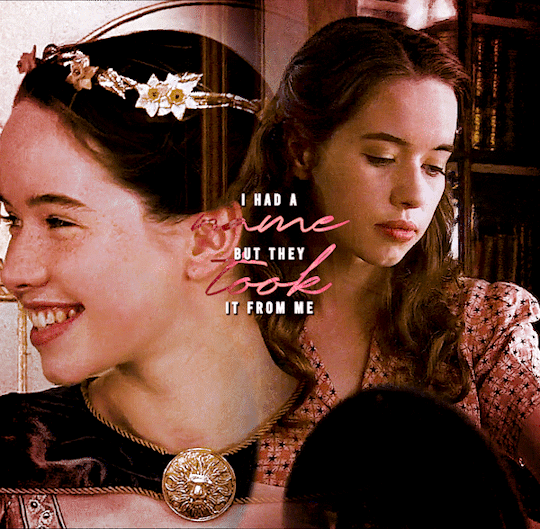
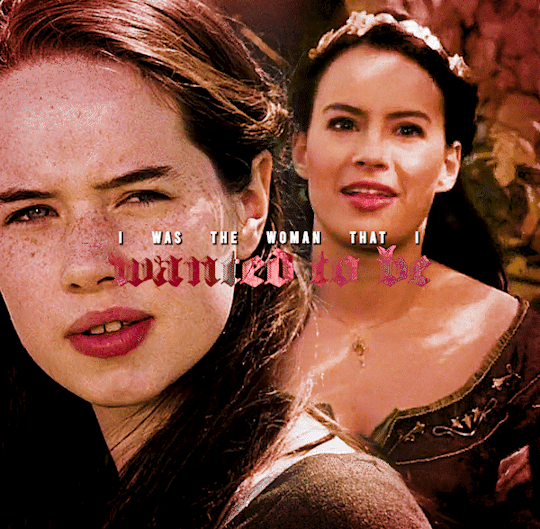



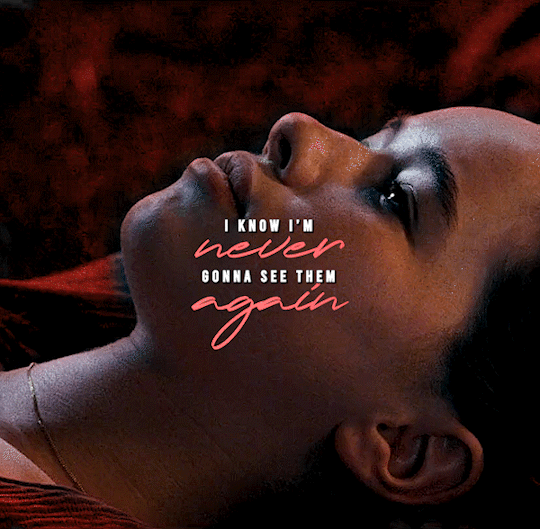


The fair and the brave and the good must die
I seen the other side of living, I know heaven's a lie
I’ll tear through the night, and I'll raise some hell
Cause I'm the World Ender, baby and I'm back from the dead
— the world ender, lord huron | insp.
#THE WHITE WITCH AIN'T GOT NOTHING ON QUEEN SUSAN#i am so glad that we have an actual shot of aslan dying#also 'the fair and the brave and the good must die' is not susan's new philosophy it's what she's realized are the rules of the universe#it also aligns pretty perfectly with the fair being edmund the brave being peter and the good being lucy#this entire gifset is just... aslan's actions being so horrible that it makes the gentle snap and turn brutal#narnia#the chronicles of narnia#tcon#susan#susan pevensie#gifs#narniaedit#thechroniclesofnarniaedit#tconedit#susanedit#susanpevensieedit#anti aslan#narnianetwork#perioddramaedit#perioddramasource#fantasyedit#disneyedit#disneygifsdaily#femaledaily#usermoh#userwxwood#anna popplewell#the lion the witch and the wardrobe#prince caspian#voyage of the dawn treader
821 notes
·
View notes
Text
we need more narnia fics fr
#the chronicals of narnia#narnia#susan pevensie#lucy pevensie#edmund pevensie#peter pevensie#aslan the lion#narnia fanfiction#fic rec#someone please make this
108 notes
·
View notes
Text
thinking about how we don't give eustace nearly enough credit for his initial reaction to coming to narnia — like the crew shits on him for being grouchy on the dawn treader but imagine if his first trip to narnia happened along with the pevensies' first trip and he didn't stick up for jadis's bullshit (aunt letty style)
jadis, attempting to appear threatening: you, son of adam, will face the wrath of my-
eustace: don't address me are you crazy?
#it's hilarious as hell because eustace is 1 year younger than lucy according to the books so you got this tiny ass baby cussing you out#aslan would have admired his guts#imagine if father christmas gave him his own dagger FUCKKSKDKS#jadis: someone silence this child#eustace: SANTA GAVE ME A DAGGER AND IM GONNA FUCK YOU UP WITH IT#i think this is an AU in the making i'm crying i love this idea a little too much#tcon#the chronicles of narnia#chronicles of narnia#narnia#voyage of the dawn treader#the lion the witch and the wardrobe#eustace scrubb#jadis#the white witch#aunt letty#narnia headcanons#narnia imagines#pevensie headcanons#pevensie imagines
568 notes
·
View notes
Note
for the prompts:
it's only after we've lost everything that we're free to do anything + susan pevensie?
both you and @cosmicsnufkin asked for the same thing! my first instinct was to do post the last battle but then Susan's obsession with her ancient dictionary grabbed me by the throat, so here you go!
prompt from this post! feel free to pick one and send me a narnia character! I'll write you a little ficlet.
_
Once, when Susan was almost Queen, and remembered how to hold her shoulders to prevent them from shattering, a glass drop held by its tail, the lion looked at her and yawned until its sickle teeth lay bare. Its spit shone red, and its tongue curled, barbed and beastly about the witch's bones.
"My dear child", it said, with a voice that could not have lived in those lungs. Its paws were, then, big enough to hold her entire, and Susan had not yet learned how to flinch. "Your brother has need of you."
Edmund, dead in the bloodied field. Edmund, sick with longing and sugar and spelled. Edmund, freezing. Edmund, with fireflower juice on his lips.
Sharp-tongued and gunpowder-still, his mouth set in a scowl. His brows furrowed. The only one of them who was not gifted a weapon, Edmund used instead his own bleeding hands and the scruff marks on the high points of his cheekbones where a ring was caught in a slap.
The beast looked at her. Its maw drew closed. The fur of its mane was still as it had been before it was shaved and its whiskers stood long and proud from its snout. There was, still, dust in its pelt. Sulphur in its breath.
Adam's bone did not break on impact. Adam's bone stood, shoulders drawn, mouth pulled tight and watched Adam's flesh wail.
"Are you like him, then?", she asked, and looked the lion in its beastly eyes.
The lion rumbled. "I am like many things. And unlike many more." It smiled, somehow, drew its mouth into a shape that would be a baring of teeth, on any other. In the soft light of the sun, its fur shone golden.
Susan watched her little brother, whose bones were yet fragile, and sharp where they broke, as he drew his first breath of three hours. "But you are like him", she said. "Only you didn't die on a cross, this time."
The beast laughed. "It doesn't have to be a cross. It just has to be an innocent." Its claws were dark with soil where they slipped against Susan's dress, caught in the weft of a silk finer than anything English she'd ever touched.
She looked at the beast, and at the melting winter in its jaws. It looked back at her, and blinked. Slowly. Measured. Susan tucked the glass tail underneath her cloak. "And you are?" She wet her lips. Listened to Edmund's rattling lungs. "Innocent?"
"Sometimes", said the lion. It flicked its ear. It hooked its claws into fabric. "No-one is any one thing, dear one. It doesn't much matter if it's Romans or witches. Human and creature both are what they are."
Susan thought of the dictionary in Professor Digory's library. Lucy's head in her lap, Peter's exasperated voice thick in the air, and Edmund's scowling face by the window. Boredom burrowed to the thick of her brain where it had sat, liquid, just below boiling until her voice had threatend to break out of her chest.
Divinity.
noun: a divine being; a god or a goddess. see also: benevolence, omniscience, indifference.
Edmund, rolling his eyes. "This is boring, Su. Who cares what it means?"
Benevolence.
noun: the quality of being well meaning; kindness.
Lucy, sighing as though the world had draped itself atop her small shoulders. "Can we go outside, Su?"
Omniscience.
noun: the state of knowing everything.
Peter, pinching his forehead. "Susie, can't we play something else? You're the only one who is good at this one."
Indifference.
noun: lack of interest, concern, or sympathy.
The beast, who had been smoke and legend for one hundred years, looked at Susan, and dragged its barbed tongue across bleeding bone. "Why did you leave?", she asked.
It weighed its terrible head. "It's only after we've lost everything that we're free to do anything", it said, and its tongue dripped from its maw. "Tears are not so easily mended, child."
Susan looked at the witch, who lay, half eaten, and dead as her brother had been, in the blooming field. Her throat torn from her neck, her guts spilling from her molten dress, her bones - not white as she'd thought, but bloodied-pink - bared and snapped.
She did not answer. Beside her, the all-knowing beast lay its head on its paws and yawned until its teeth shone in the sun. Susan had stood there, breathing.
Unflinching, yet.
In 1949, Susan Pevensie buries her loves in a field of wild flowers. Her aunt taps against the frozen glass tail. It shatters.
#susan pevensie#the chronicles of narnia#narnia#tcon#narnia fanfiction#narnia fanfic#aslan#the problem of susan#susan vs aslan: fight#sorry this is an anti aslan household thus. disrespect#larissa makes things#narnia prompt fill
92 notes
·
View notes
Text
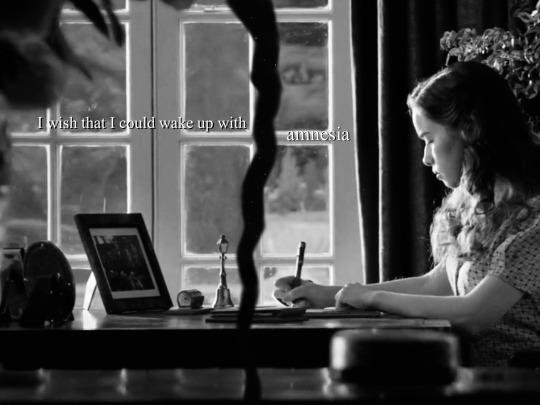

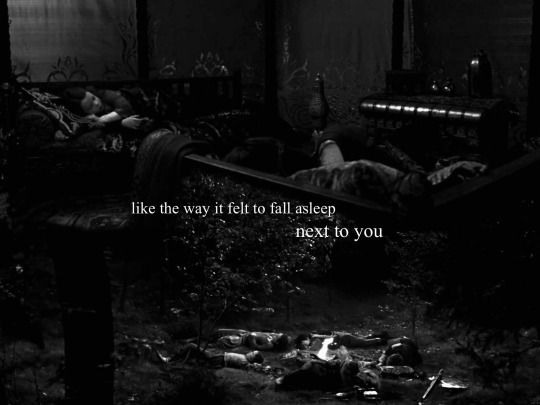
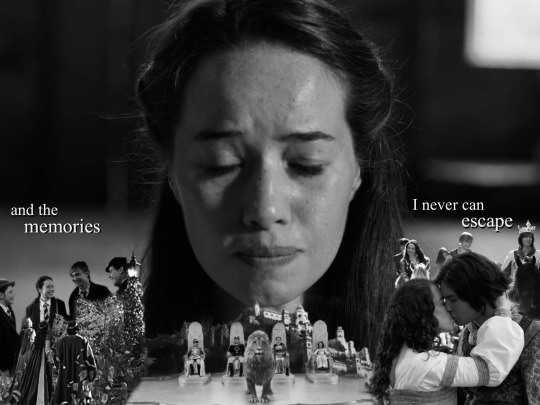
I wish that I could wake up with amnesia and forget about the stupid little things, like the way it felt to fall asleep next to you and the memories I never can escape - amnesia, five seconds of summer
I like to think (in a very loose definition of ‘like’) that after The Last Battle all of the memories of Narnia came back to Susan, and though generally she was glad for it, when things got too much, sometimes she wished that she could forget again.
#narnia#narnia edit#tcon#tconedit#the chronicles of narnia#susan pevensie#the pevensies#peter pevensie#edmund pevensie#lucy pevensie#aslan#caspian x#disappears for *checks notes* two months; comes back and immediately makes everyone else suffer the consequences of too many emotions lmao
264 notes
·
View notes
Text
thinking about how the White Witch represents the devil in that she offers Edmund something that he wants (power by becoming her prince) and something that he needs (acceptance and recognition through aforementioned power and her attention of him) but behind it is bitterness and destruction and death, because she is just using him and there is nothing real in her words
thinking about how when Edmund finally chooses to repent and be sorry and admit that he was wrong, Aslan gives him something so much better than the witch's empty promises: genuine love, respect, and a kingdom to rule as a king alongside his siblings, not just a mere prince. a king. because Aslan is not using Edmund to discard him like trash once He's done using him. and Aslan's words are real
thinking about how Jesus often asks us to do things we don't want (in Ed's case, to repent and let himself be loved), while meanwhile the devil is whispering "no, you don't have to do that, do this instead and I'll give you all you could wish for", but if we choose to do the hard thing Jesus is asking - not forcing, mind you, but asking - us to do, the reward is so much greater than any of the empty, broken things the devil promises us
thinking about how while the devil's words are so shiny and powerful and how they might seem tempting, his rewards are bitter and will turn to ash in the end. but Jesus asks us to do hard things that we might not enjoy, but the rewards are greater than anything we could ever imagine, because His words are true and genuine and good, and full of love, and. and the devil's requests are easy but end in heartbreak, and the Lord's are hard but they end in so much joy, and and and
#narnia#edmund pevensie#aslan#christianity#ramblings from the void#it just hit me#that the white witch offered to make edmund a prince#meanwhile Aslan made him a KING#and FORGAVE him#and the white witch wanted to kill edmund and his siblings
16 notes
·
View notes
Text
Guys hlep I'm CRYING I'm reading Narnia for the first time since like. 5th grade. And that scene in the Magician's Nephew when Digory is asking Aslan to help cure his mother. And even though Digory had just accidentally been the means of bringing evil into His brand-new world. Aslan just. Has compassion for him and weeps with him and I'm SOBBIGN UGGGHHHH 😭😭😭😭😭
#maybe i'm just hormonal rn but i was just listening to the audiobook and making dinner and that moment hit me SO HARD WHY AM I CRYING#the gospel parallels got to me okay??? ❤️😭#the chronicles of narnia#digory kirke#aslan#narnia#c. s. lewis#christianity#biblical parallels
68 notes
·
View notes
Text
Huh do you guys remember the book tuck everlasting? How the main girl Winnie was a fat ten year old with an immortal love interest who was "17" but actually like 100 n something and the whole thing with him was he wanted her to drink the everlasting water when she turned 17 so shed be 17 forever and they could get married like that was kinda weird he would.like take her just the two of em and talk up marriage with her and she was like TEN ? They changed it in the movie and made her a skinny fifteen year old but still wow I'm surprised why so many christan parents let that romance book be allowed but like....pride n prejudice was a debate? I don't understand the logic of homeschool mother's AT ALL WHY WAS THAT BOOK ALLOWED BUT WHY WAS I SCREAMED AT FOR CHECKING OUT OLD YELLER AT THE LIBRARY BY A HOMESCHOOL MOTHER IN OUR CO-OP???
#like uh i remember reading that book when i was 11#and uh it's a lil weird just saying#i remember being really angry they made her skinny in the movie but uh maybe I'm misremembering but i picked it up to read to my siblings#and once again had to 'lose it' because uhhhhhhhhhh what the fuck#im not sure if the author made it intentionally creepy for jessie to be pushing and preparing her for marriage and being alone with her but#uhhhhhh I didn't like him when i was a kid and i sure as fuck am like wow#I'm not sure if the author was trying to make it negative and about grooming because the homeschool moms always acted like it was romantic#they always went awwwww i wish she hadn't wasted that wayer on a frog but like#idk#once again why was that romance ok but pride n prejudice romance not ok for some homeschool moms?????????????#like we did p&p the play in lur drama troup and uhhhh a lot of familys dropped out#i loved it though i played jane it was so good and fun#also there was.like 6 moms in the homeschool co-op that just made my life H E L L#like they literally humiliated and bullied me constantly and over minor things like reading OLD YELLER?????????#like don't get me STARTED on the harry potter lotr and anything that had magic drama#giving Narnia which is like the most Christian homeschooler books got me in trouble with like four of em BECAUSE MAGOC? EVEN THOUGH ASLAN#just I do not understand the logic#like i just DON'T GET IT#like grooming is romantic but#like magic is evil? and don't you dare read that book where the dog dies you evil little bitch
3 notes
·
View notes
Text
I love big primordial death god characters that appears to young girl characters as giant wild animals who are lethal and kind.
#I wrote this as a joke about neverafter but then I remembered the sexy shark death god the wizard-whales in the young magicians series#Wait it was the young wizards series#And then I also remembered Aslan. Who I could make an argument is also a death god#In certain aspects among other things#So I really do love the trope.#D20#the young wizards#Narnia#Oh and that one short story someone was working on years ago about the tiny girl who’s the death god priestess in a world of gods#wow these are all coming back to me
10 notes
·
View notes
Text
the part in pc where lucy doesn't go after aslan when the others doubt her is sort of out of character. I mean, ignoring all the significance of its easy to doubt yourself (or your belief) when others do, lucy is constantly running away from the others and I love it, they look annoyed for a split second and the follow her.
but she would have done that at the gorge, I don't think she would have just pointed aslan out and given the others time to doubt her, because she hasn't in the past, she's seen something interesting and run towards it, I think she would have just run towards him and found the path that way, because after all its been at least a year since she's seen aslan and she loves him the best
#it makes sense from lewis' pov#the dont doubt your belief just because others do aspect of it#and its obviously important to the story#however#as previously stated#i dont think she would have given the others time to doubt her#lucy pevensie#the chronicles of narnia#narnia#the pevensies#aslan#prince caspian
20 notes
·
View notes
Text
Professor Kirke remained at the small dining table after the last of the dishes had been cleared away, puffing clouds on his pipe. It was strange, thought Lucy: he had a faraway look in his eyes, as though some tiny aspect of his reality had shifted over dinner and he was struggling to accommodate it.
“I wonder what he’s thinking about,” murmured Lucy to the others. Edmund shrugged and Eustace (who had only met the professor that night) said nothing, but Peter chuckled merrily and patted Lucy on the arm.
“You’ll find out soon enough, that’s certain. He got that look in his eye when you were talking about the Island of Dreams, Lu. No doubt he’ll call you into his study for a lesson later on.”
It was a little more than a week later that Peter’s prediction came true. Professor Kirke seated himself across his desk from Lucy with an enormous tome of poetry spread out before him. “Have you heard The Rime of the Ancient Mariner?” he inquired.
Lucy shook her head. Yet rather than muttering about the state of the schools as she had expected, Professor Kirke simply smiled beneath his whiskers and began to declaim:
“It is an ancient Mariner /And he stoppeth one of three —"
Lucy leaned back in her seat and fixed her attention on the words as best she could. Once, she’d spoken in such a register as queen of Narnia, but now she was only a girl of ten and unaccustomed to the flowery language of Romantic poetry.
“At length did cross an Albatross,
Thorough the fog it came—”
“Oh!” cried Lucy. “Is that why you wanted me to hear this poem?”
“Just so,” the professor replied. “Your account of the Island where Dreams Come True bears a marked resemblance to The Rime, beginning with the presence of the albatross. In this poem, the albatross bears a symbolic connection to Jesus Christ himself.”
“How peculiar!”
“I thought so too. Samuel Taylor Coleridge wrote this poem in 1797, in a time when sea voyages to the polar regions were very much like your own voyage to the end of the world. The albatross had only lately been described in writing, but he wrote it coming out of the desolate fog to guide sailors to safety. And Coleridge was a neo-Platonist! Fog and ice are very much like darkness, the way he uses them here.”
“A neo-Platonist?” Lucy asked, wrinkling her nose.
And now came the Professor’s customary muttering. “Yes. What do they teach in these schools? You may read darkness and fog both in Coleridge as something between ignorance and innocence, with the Sun as a symbol of Reason. Does that make sense?”
“A little,” said Lucy, who privately didn’t think it made much sense at all but was eager for the professor to continue the poem.
“It ate the food it ne'er had eat,
And round and round it flew.
The ice did split with a thunder-fit;
The helmsman steered us through!”
Lucy hadn’t meant to interrupt again so soon, but the words were out of her mouth before she was really aware that she’d spoken them. “So it really is just like in Narnia! It guides the ship out of the ice like my Albatross guided us out of the darkness.”
“Yes.” Professor Kirke was entirely unperturbed by the interruption. “Precisely.”
“How lovely. Isn’t it interesting how you just know when birds are trustworthy?”
The professor chuckled. “You may change your mind in a few stanzas. Shall I go on?”
“Please.”
Lucy returned to her concentration as the mariner recounted how a good wind had sprung up after the Albatross and how it had stayed with the ship and perched on the mast sometimes for evening prayers. Yet the mariner must have looked unhappy, for the groom interrupted to ask him why.
“With my cross-bow/ I shot the albatross.” Professor Kirke paused here in his telling and looked very hard at Lucy.
It took her a long moment to understand. “The albatross isn’t dead, is he?”
“He is.”
“I thought you said he was like Aslan.”
“And didn’t you see Aslan die?”
Lucy opened her mouth, but closed it a moment later. Open again, “But why did the mariner kill him? Doesn’t he give any reason? The witch killed Aslan because she was evil and trying to conquer Narnia. Why would the mariner kill the albatross when it’s done nothing but help him?”
“Perhaps,” the professor replied, “the Gospels are a simpler comparison here. ‘I shot the albatross’ has the same kind of blunt irrefutability as ‘And they crucified him.’ There isn’t any excuse, which I think makes the confession all the more powerful.”
Lucy sighed. It was exhausting trying to keep this all straight. “I suppose that makes a kind of sense. But then we’re trying to think on three different levels of parallel—the poem, the Bible and Narnia—which isn’t very pleasant.”
“And yet, it’s necessary if one wishes to understand deeper meanings. We can pause for tea, if you’d like?”
“No, that’s alright. I think I’m keeping track well enough for now. I say though, is this what you do with Peter all day?”
The question seemed to catch Professor Kirke off guard, for he let out a sudden, loud burst of laughter as soon as Lucy asked it. “Yes, after a manner of speaking. Shall we go on?”
“Ah! well a-day! what evil looks
Had I from old and young!
Instead of the cross, the Albatross
About my neck was hung.”
It was a difficult thing to imagine and Lucy wondered if Aslan’s albatross was unusually large. Aslan was always bigger than she expected him to be, so it would not be strange if he took the form of an unusually large albatross. Yet the more Lucy considered, the more sense the image made.
“It must have been at least three meters,” said Lucy. “The albatross, I mean. Mine was more like four, from wingtip to wingtip. It would be a dreadful weight, but I suppose that’s the point. The mariner can’t carry it, can he?”
“I think you’re right,” said Professor Kirke.
A smile tugged at Lucy’s cheeks. It was lovely to hear the professor give such an unequivocal endorsement of her analysis. Galvanized by the success, she continued, “I thought of a cross when my albatross appeared out of the darkness. There’s something in the proportion of the body to the wings, and in its stillness of it as it glides through the air. My albatross tore away the darkness. But here—it’s like the mariner carries his albatross like he thinks that act can save him from what he’s done.”
There was a glittering in the old professor’s eyes then, and suddenly Lucy realized that she wasn’t struggling with the poem’s language anymore. Maybe it was because she’d been listening to it for the better part of ten minutes, but privately she wondered if Narnia’s magic might be working on her somehow. Perhaps this poem contained some quality of the rich Narnian air.
“I looked to heaven, and tried to pray;
But or ever a prayer had gusht,
A wicked whisper came, and made
My heart as dry as dust.”
Lucy shut her eyes and remembered the fighting-top of the Dawn Treader. The night-mare life-in-death was a black abyss, and all her own nightmares had been there in it. There had been monsters, of course, and the idea that even if she ran down to stand beside Edmund he might become a monster himself. But somewhere in all that dark, there was a Lucy who never spoke to Aslan again. She’d imagined herself in Lord Rhoop’s place, trapped forever in a state of endless fear-without-courage, because she could not call him.
“That was my night-mare too,” she whispered. “Not being able to pray.”
She saw the professor’s lips thin beneath his whiskers and wondered at it. “You’re wiser than you have any right to be,” he murmured. “Ten years old and your greatest nightmare is alienation from God. What a marvel you’ll be when you’re grown.”
Well then. Lucy didn’t have any notion what to say to that. She half expected that if she tried to reply, she might start crying.
“Might I ask—what did you do then? Until the albatross arrived, once you realized that you couldn’t pray. How did you react?”
And that was a question she could answer.
“But I could pray! I did. I whispered, ‘Aslan, if you ever loved us at all, send us help now.’ And that was when the albatross came. I didn’t talk about it after—it was too much my own for me to share it, really—Edmund knows—but well…”
The professor made a sort of choked noise in his throat. “Perhaps it was the only nightmare that the island couldn’t bring true.”
“But there have been times,” continued Lucy, “when my heart was too dry to speak with Aslan. There were whole years when I was queen that he didn’t come at all.”
It was with a much softer voice that Professor Kirke resumed his reading.
“A spring of love gushed from my heart,
And I blessed them unaware:
Sure my kind saint took pity on me,
And I blessed them unaware.
The self-same moment I could pray;
And from my neck so free
The Albatross fell off, and sank
Like lead into the sea.”
Here, the professor lapsed into silence. Lucy thought that the poem might be over, but when she peered across the desk at the page there were columns of stanzas still left.
“Even after all these years,” he whispered, “some things still remind me of my own days in Narnia.”
He’d told the children his story before, of course: beginning with how he met Aunt Polly and concluding with the origins of the wardrobe. Aslan had not condemned him for bringing the White Witch to Narnia. Instead, he’d had loved Digory enough to shed tears and sent him home with an apple so beautiful that it healed his dying mother.
“Grace,” Lucy whispered into the hush. “Of course. Maybe this is the moment where Aslan leads the mariner out of the darkness.”
Professor Kirke exhaled heavily. The faraway look in his eye lessened a little bit, and at length he read on.
“The spirit slid: and it was he
That made the ship to go.”
Never had Lucy felt Aslan’s presence more keenly in his absence than during those last days as the Dawn Treader had sailed over the still, clear waters at world’s end; like Aslan himself had been drawing them towards himself by some great, invisible rope.
The closer they’d come to his country, the more tangible his spirit had been. When at last she glimpsed those green mountains beyond the waves, Lucy’s very bones understood that Aslan had made the still seas bring them there.
A voice spoke out of the air concerning the mariner, and Lucy remembered the piercing silence of the Last Sea. Of the voice, the mariner said, “He loved the bird that loved the man/ Who shot him with his bow.”
Not for the first time, Lucy wondered about Aslan’s father, the Emperor-beyond-the-Sea. What did he say to Aslan when he left that land of high mountains to return to Narnia and die at the Witch’s hand? What did he think when Aslan went flying across the lily-covered seas on feathered wings to rescue their little ship? If Lucy had crossed that final threshold with Reepicheep, would she have met the Emperor there?
“The voice is his father,” Lucy said, voice brimming with certainty. “The albatross’s father, I mean. The Emperor-beyond-the-Sea.”
“I know,” the professor replied. “And beyond the sea is just where our mariner meets him.”
“Do you think the mariner knew that the albatross loved him?”
The professor stroked his chin again, and a ghost of a smile played across his features. “If the mariner didn’t know it when he shot him, he certainly knows now. But come, we’re nearly at the end of the poem.
“Swiftly, swiftly flew the ship,
Yet she sailed softly too:
Sweetly, sweetly blew the breeze—
On me alone it blew.
Oh! dream of joy! is this indeed
The light-house top I see?”
“There’s one more thing I haven’t told you,” Lucy said. “Something so bright and mysterious that I’ve not even told Edmund. When the albatross came, it—it spoke to me. And I wasn’t afraid anymore.”
Professor Kirke leaned forward, but his words were, “You needn’t tell me what he said if you’d prefer not to.”
Lucy nodded slowly. Somehow, she knew that if she tried to describe “Courage, dear heart,” she would fail. There was nothing, no word or image or music or poetry in this world or any other that could convey what that moment had been. To speak of it at all would be like dancing about architecture.
“I was the only one who heard him,” Lucy whispered. “It was my prayer, and he spoke to me. I wonder how this poet knows what it was like?”
“I think he knows the same way I do, in my own way. Coleridge lived a difficult life. He was a laudanum addict when he wrote this, for one thing. When the Divine voice speaks into our darkness and we feel his breath on our faces, it binds us together with every other person who has ever been rescued by an albatross that loved us. We don’t know what he says to other people, but we know how the breeze feels.”
The professor returned to his reading and concluded the poem while Lucy sat in astonishment and let the strangeness of the last hour wash over her.
“…A sadder and a wiser man/ He rose the morrow morn,” and with those words Professor Kirke shut the book. The heavy pages fell with a thud, and with bright eyes he looked at Lucy. “What do you think of it?”
“I think,” said Lucy slowly, “that it was a beautiful story. The very best kind.”
What she did not say, but what she was thinking, was that it reminded her of the story she’d read in the Magician’s book: the one about the cup, the sword, the tree, and the green hill. The two tales had no common points of reference, but they left her with much the same feeling.
“But why do you think Aslan came to me as an albatross?”
Professor Kirke harrumphed. “I have been asking myself that same question ever since you spoke of it. Why indeed? I wonder whether perhaps in part he appeared that way so that you would come back here and read ‘The Rime of the Ancient Mariner,’ and come to know him better by it. If nothing else, I do not think it was a coincidence.”
Yes, perhaps, but the answer still felt incomplete. “Maybe it’s a stone in the bridge he talked about,” Lucy said. “Maybe he only wanted to show me—to show us—that he’s here too. In this world, in this time, and in all others. Maybe it’s like you said, and there’s an albatross for every person who’s ever been rescued from the darkness.”
#i have wanted to write something like this for a loooooong time#but kinda felt like i wasn't up for the challenge#i'm off for a few days so i finally got it in 'good enough' shape though i'm far from being totally happy with it#hopefully it will make sense to people who haven't read The Rime#though it was written with an assumption that at least some cultural osmosis will have gotten to folks#i go absolutely crazy for the way that Jack incorporated the albatross from Rime into VDT#it is so darn elegant#he both upholds and subverts the symbolism of the original#i love love love love it#and i wish someone would assign me like an actual academic essay on the topic#in the meantime we'll have to get by with literary analysis just barely couched in narrative#dear darling heart-daughter of aslan#the magician's nephew no longer#into light#(courage dear heart)#narnia#leah stories#pontifications and creations#also! i just cross-posted to ao3 if you'd rather read this there#i know it got pretty long#(and i skimmed over a LOT)#intertextuality#characters within a work notice the intertextuality#if this makes your brain hurt a little bit i think i did my job right
36 notes
·
View notes
Photo
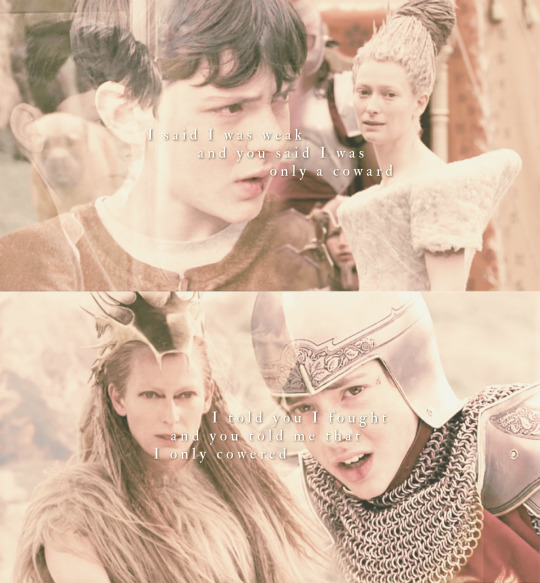



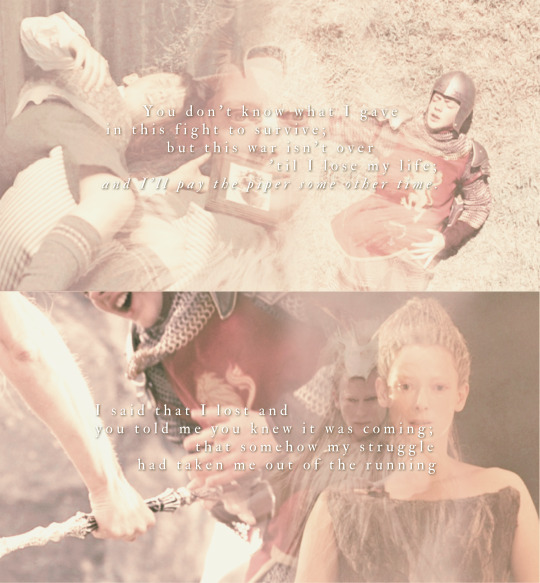



Pay the Piper // MJM
#narnia#narnia edit#the chronicles of narnia#edmund pevensie#the lion the witch and the wardrobe#did I need to edit this? maybe not#but the desire struck and I followed it#lol a lot of feelings in this song#but catch me screaming at the title every dang time#I'm actually very petty. fun fact#BUT HI LET'S MAKE THIS ABOUT EDMUND NOW#AND HOW WHEN YOU'RE TRYING TO HEAL FROM SOMETHING#AND YOU KEEP FALLING INTO IT#IT ISN'T ALL THAT HELPFUL FOR THAT THING TO KEEP SAYING#'YOU BELONG TO ME'#HOW LOSING THE FIGHT DOESN'T MEAN YOU DIDN'T FIGHT IT#HOW NOT HAVING THE STRENGTH TO CHANGE IN AN INSTANT DOESN'T MEAN YOU'RE NOT CHANGING AT ALL#'his blood is my property' Jadis says#but it's not. not anymore#Aslan pays the wages so Edmund can live free#life is not without justice#but it is so full of grace#and I truly believe God sees our struggles#and roots for our tiny victories#celebrating every miniscule moment that brings us closer to him#even if it's a long heckin' road#...just keep walking#(that's my whole thing isn't it? that's my testimony)#just. keep. walking.
33 notes
·
View notes
Text
NEW TRANSFORMERS MOVIE NOT DIRECTED BY MICHAEL BAY REAL NOT CLICKBAIT

#HOOOOOOLY SHIIIIIIIT !!!!!!!!!!!!!!!!!!!!!!!!!!1111#LETTING OUT THE BIGGEST YEA BOYYY OF MY ENTIRE LIFE#i will not apologize for the person i might become when this movie comes out#finally......my boys are freed from tyranny (bay not knowing how to make a good story)#this calls for a CELEBRATION (time to listen to the transformers soundtracks on repeat)#i can only hope that they bring steve jablonksy back for the soundtracks because he is SO <33333!!!#but peter cullen is still optimus prime !!!!!!!!!!!#not to be a Nerd (tm) on main but when i heard his voice in the trailer!?!?!? instant joy all throughout my entire body#he's like liam neeson as aslan in narnia. his voice is just the embodiment of <3333!!!!<333!!#anyway. anyway#i'm COOL i'm CALM i'm COLLECTED and i'm gonna be NORMAL ABOUT THIS (lie)#apologies in advance to followers im shifting back into Giant Robot Mode#winter speaks
11 notes
·
View notes
Note
pc movie miraz is adept at handling his heir. can i have a headcanon as to why he's so confident with babies pls
when miraz picks up his son from the cradle, he's reminded of a newborn he once held, many years ago.
it nearly cost him everything.
you see, miraz was someone who took the matter of becoming king very seriously, and he knew he was going to be in it for the long haul. he was observant to the king's mannerisms and habits. he noted down the schedules he had, the people he would be around that could make for potential spies. for several months, miraz worked on his scheme; he made sure to adjust his arrangements and organize safety nets to combat just about any possible outcome.
but his calculations never included a nephew.
"miraz! would you like to hold him?" his sister-in-law asks, interrupting his thoughts. he jolts before smiling and raising his hands in surrender.
"i couldn't. i don't know how."
he felt guilty enough for plotting the death of someone's husband. now someone's father?
"i'll show you," she smiles gently, reaching out and pulling him forward. the bundle in her other arm squirms. miraz looks to his older brother for permission (a bad habit), and his heart twists ugly at the pride painted on the father's face. i'm losing time.
miraz sets aside the anger, however, for the sake of the mother and child, and follows his directions dutifully once the king nods back in approval.
a grave, grave mistake. miraz, with the help of the queen's supportive affirmations, finally gathers the courage to pick up prince caspian. he wishes he had the same amount of courage to drop him. instead, his heart disarms his mind from the intrusive thought and succumbs to the heir's divine innocence at a speed that leaves him largely ashamed. he doesn't realize what he's doing with the coo that falls from his lips or the finger that raises itself to wiggle in front of the child prince until he hears his brother and sister-in-law fail to stifle their laughter. in that moment, miraz realizes he could do the most foolish things for this child's happiness.
but what about his own that was so painfully denied for all these years? the question sobers him.
well, miraz was merciful in the ways he knew best. after consulting with professor cornelius (under the guise of intellectual banter) regarding when one's memory begins, he gave his brother and sister-in-law a generous one year with the baby. many telmarines and narnians alike would hardly call it that, but no one understands the agony of overlooking every perfect chance to kill the king the way miraz does. he places their happiness over his as he's done before, and bides his time.
it's the best he could do, he reminded himself, when the servant tried to shake the king awake one morning, the king who, with closed eyes, still held his baby close to him. it's the best he could do, he reminded himself, when he paid the royal apothecary to lie on the autopsy and not mention the poison found on the king's lips. it's the best he could do, he reminded himself, when the queen drove herself mad with grief and disappeared into the woods after the funeral, leaving the castle with only a prince and his uncle as the last markers of royalty.
the plan would have gone a lot better had there been no child involved, miraz acknowledges, but overall it was executed perfectly given the circumstances. the king is gone and his wife has relinquished her claim on the throne, just like that. so why does he feel no satisfaction? he's closer to his goal than ever before.
... ah. that's it, isn't it? he hasn't reached his goal yet.
the child remains.
prunaprismia sings caspian to sleep on the night miraz calls the last search party off. we've looked everywhere. she's gone, sir. with tired eyes, miraz returns to the castle and walks in on her cradling caspian. their eyes meet. he hangs his head solemnly. she looks at him for a moment before turning away. she continues to sing, albeit shakily now.
she's always wanted a child of her own, miraz muses. he does too. wouldn't it be wonderful, if they had a strong and brilliant son who could inherit the kingdom from him? and for a moment, with success a few steps away, he considers taking the current prince from his wife and putting him to sleep the same way as his father, silently and painlessly. he's right there. no one would know.
lightning blinds miraz through the clear window and a roar of thunder startles him. caspian awakes, and his cries ring loud through the castle.
something changes then and there.
miraz doesn't kill him that night nor any of the following nights. slowly years begin to pass by and caspian grows. they go on walks in the garden together. professor cornelius becomes his tutor. prunaprismia teaches him how to braid flower crowns. caspian the tenth is alive for a reason miraz can't quite place.
that's a lie. he knows. he knows the reason why, just can't come face to face with it. the reality is that miraz doesn't have it in him to take caspian's life, even when the opportunity is served to him on a silver platter. and so he waits like he waited before, but for two decades' worth, so that when the time comes, he can tell himself this was the best he could do.
i need air, miraz thinks as he makes his way to the balcony with the bundle in his arms. the ghosts of his past weigh down on his lungs like anchors, and they pull stronger when prunaprismia asks where caspian is. he doesn't look at his heir anymore; shameful as it is, he fears looking down and finding prince caspian the infant in his arms instead, the child orphaned by his uncle for no fault of his own, who, against all odds, grew into something of a son to him over the years.
as the soldiers come back through the gates, miraz gives the heir back to his wife and wonders who he's seizing this throne for.
#this is kind of long please bear with me#as a note: anon is referring to a deleted scene#tl;dr miraz has cognitive dissonance and can't resolve wanting the throne versus wanting to keep caspian alive and makes a mess of things#this is one of the most *vaguely gestures* pieces i've ever written#i'm not sure how i feel about it but i hope it's to your liking dear anon!#(find aslan if you can)#death mention#poison mention#tcon headcanons#tcon imagines#the chronicles of narnia#chronicles of narnia#narnia#narnia headcanons#narnia imagines#miraz#prunaprismia#caspian x#caspian ix#cornelius
62 notes
·
View notes